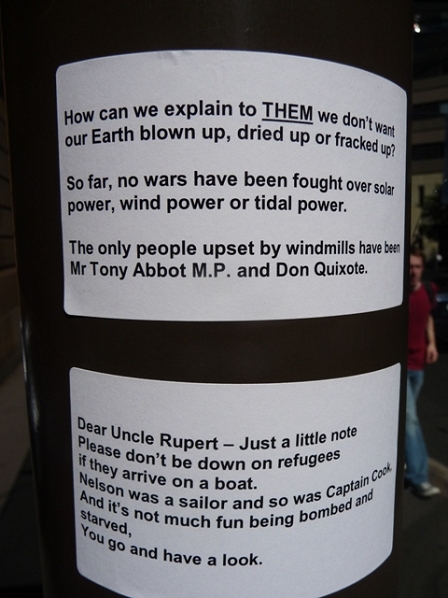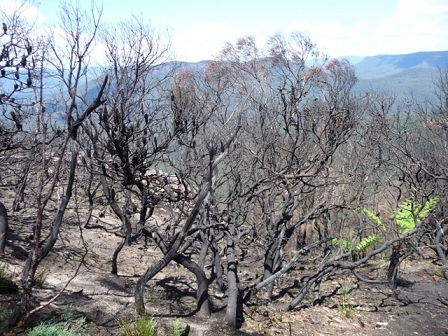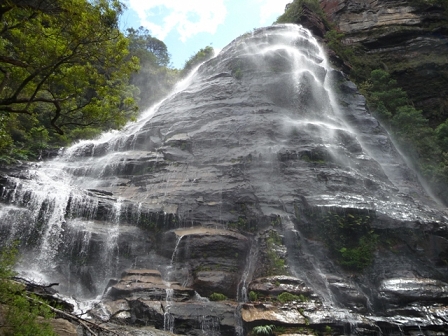Erstellt am: 4. 12. 2011 - 11:26 Uhr
The Climate Change Front Line
"They're faakin' charging us for the faakin' air we faakin' breath", Gloria complained. We were walking towards her big white car on the main street of a quiet village in the mountains above Australia's Gold Coast. I looked around over my shoulder, rather embarrassed by this barrage of expletives. It was taking me a while to get used to the robust way Australians tend to express themselves when displeased.
This is a country where, as Bill Bryson has noted, even prime ministers are known to call opponents “piss-ants” and “perfumed gigolos”. Aussies don’t like to mince their words.
Gloria was a large woman. She was darkly tanned and was wearing out-sized sun-glasses. She jutted her chin out as she said spoke as if daring anyone to challenge her in her view Australia's brand new "carbon tax" was a load of nonsense.
This law, which is officially known as the Clean Energy Act, matters globally because it has been passed in the country with the world's highest per capita emissions.

chris cummins
It matters because of what Todd Stern, the chief US climate negotiator has called a "global commons" problem- The latest UN Framework Convention on Climate Change is well underway in Durban, South Africa but the whole process is bogged down in a mire of mutual mistrust and disillusionment.
Deep divisions between the developing and developed world remain over any plan for a binding global system of carbon cuts still unresolved, with the pressing concerns of the global economic crisis and elections looming in the USA, no-one is daring to hope for any significant breakthrough, just incremental steps and rare signs of good will. As Stern told the International Herald Tribune, "In reality, the most effective thing that we can do to address climate change is for all relevant countries to act vigorously at home," and this is vital because "each country needs confidence that others are acting." Because of its emissions statistics, Australia is a focus of attention. It has to be a mover.
From an environmental point of view the carbon tax is an important first step. Under the plan carbon will be priced much higher than in Europe's trading scheme. The WWF’s Jonathon Larkin, who I met in his office near Sydney’s Darling Harbour, is impressed by the legislation. Even if the plan has been watered down after the years of debate and political battles, the rules that have been put in place mean that the 500 biggest polluting companies have to pay for their pollution. Also, a 2050 target has been agreed on to reduce emissions by 80% from the levels of the year 2000 and billions of dollars will be invested in the renewable energy sector. But the legislation passed very narrowly, with 36 votes in favour and 32 against in Australia's upper house, the Senate and it remains an unpopular law for many Australians.
The positive vote was on the 8th of November, the day I arrived in Australia, in my own cloud of carbon emissions. The evening news featured Labour Prime Minister Julia Gillard triumphantly announcing that "Today we have made history", adding that "after all those years of debate and division, our nation has got the job done."
There is little chance however that the divisions will now consigned to history. Gillard herself was initially opposed to the tax which had been championed by the party colleague she ousted as Prime Minister, Kevin Rudd. In a speech before the last election in 2010, now splashed all over YouTube she is seen promising Australians "there will be no carbon tax under the government I lead". It's thought she was more or less forced to push for the bill under the strong influence of the Greens who have supported her in a hung parliament. There have been large public protests against the tax, and opposition leader Tony Abbott (whose biography, by the way, is subtitled "A Man's Man") has already vowed that he will repeal the law, which he calls "the mother of all taxes" if it wins the next elections in 2013.
It might be a shrewd election strategy. Among many parts of the population the opposition to carbon-reduction measures is vigorous and also understandable. Australia has an economy that is more reliant than most on energy-intensive industries such as mining, including coal. The conservative newspaper “The Australian” has asked whether the politicians who voted in favour of the tax were "recklessly shooting our wealth-creating industries in the foot to the advantage of their foreign competitors.” Abbott has claimed that the law will add hundreds of dollars to utility bills.
That's what had sent Gloria on her foul-mouthed tirade as we drove up to her wooden house nestled in the rainforest below Brisbane. The house was an eccentric mix. Gloria was "spiritual", but, as her wild language had already suggested, in a charmingly original way.
She went on regular retreats to India and her home is decorated with framed nuggets of wisdom from the famously mild-mannered Dalai Lama. She had a shrine that was surrounded by plastic representations of sorts of Indian gods. I recognised the elephant headed Ganesha, the god of success, as well as Hanuman, the god of the wind, but for some reason there was also a little plastic figurine of Homer Simpson, who is presumably the god of donuts. There was incense and a little machine that purred out the soothing sound of waves breaking in the oceans. She loved trees and had chased her husband out of the house for a week when he had chopped some down from their garden to "improve the view". But she didn't believe in man-made climate change at all – maintaining the planet was actually cooling. "I told a friend in India about the carbon tax," she chuckled as she served me a cup of coffee from a rather unspiritual Nespresso machine, "and he said 'who are you paying the money to? God".

christian cummins
“Certainly there is a work that needs to be done to make people understand this law,” says the WWF’s Jonathon Larkin. He insists that the legislation will not have a dramatic effect on people’s day to day lives. “It’s not going to see prices go through the roof. We’re not going to see whole industries collapse.” He says that most economic modelling shows that the Australian economy will continue to grow very strongly even with the tax. “Putting a price on carbon is estimated to raise prices by around 1% or 2%, he says. ”We’re really talking about a tiny bit of pain for a huge environmental gain.”
The Greens had been the election surprise in 2010 and it is clear that many Australians are now in favour of strong action against climate change. Several young Australians I met in Sydney described the carbon tax as long overdue. Australia is very much on the front line of climate change and scientists have blamed this century's freak weather - a record drought followed by record floods which have cost the economy tens of billions. Australia is a hot, dry country where the vast majority of the population live along the coast. “In Australia there is a feeling of vulnerability to the elements. We live in quite a wild country.” The destruction of severe climate change projected by scientists would negatively impact every aspect of economic activity in this country.
The government hopes Australia can pave the way in turning environmental concerns into prosperity. The hope is that the law will boost investment in clean energy- and what better country to develop solar power. Gillard described it as "a win for those who would seek their fortunes and make their way by having jobs in our clean energy sector" but with the future of the law a doubt after the next election, investors will be very wary.

christian cummins
Yet Jonathon Larkin is sure that the tide is turning. He describes the idea that the law will be repealed as “fanciful”. Australia, he says, simply can’t afford to ignore the challenges of climate change.
“Australians are very proud of their natural heritage. It is part of our national identity to protect areas like the Great Barrier Reef and the Tasmanian forests and the Outback. They’re all very vulnerable to the effects of climate change. I think people are willing to change their behaviour. They know what’s at stake.”


